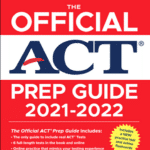Do me a favor, Magooshers. Go get your folks. This article is for them.
“But what should I do after that?”
Get back to studying for the ACT, of course. Or at least do some chores for your poor parents. This article is about how THEY can help YOU. You might want to get crackin’ on returning the favor.

Okay, so now that it’s just us adults, let’s talk about how you can get your child motivated, psyched up, and just all-around prepared for the ACT!
Discover Just How Much You Can ‘Help’
It is common knowledge that every parent will tell their high school-aged child that “I was great at insert name of academic subject here in school. I can help you study!”
Though not a parent myself, I applaud the enthusiasm of every parent who tries to help their child with homework or test prep. That being said, even if you made 30+ on the ACT, it’s possible that that was 30+ years ago. See what I’m getting at here?

Here’s what I recommend before you start trying to work through problems with your child. By yourself, sit down with your child’s study book and do some practice problems from all four parts of the ACT. Not only will you gain a better appreciation of what test day will be like, you’ll quickly discover how much you’ve forgotten (and retained) since high school.
Even if you’ve forgotten a lot, I’m sure that you’ll discover that you have a few academic strengths. Only then go to your child with an offer of help. If you tell him or her that you took the time to try some of the problems, your child should be more willing to accept your help.
Time for a Tutor?
Okay, so you’ve realized that you’re not the right person to help your child with ACT prep. That’s okay! Even for parents who teach high school, getting their child ready for the ACT can seem like a Sisyphean task.
First of all, take a minute to read my article on Choosing an ACT/SAT Tutor. In there is a lot of good advice that will help you and your child find the right person.
One thing to remember is that no matter how good your child’s tutor is, your child’s success on the ACT ultimately boils down to his or her effort. Tutors can only show their students the door to ACT success. The students have to decide to go through it.
Another thing to keep in mind is that once you’ve vetted your tutor, it’s time to let the tutor do his or her job. What do I mean? I’m not accusing anyone of being a helicopter parent, but when the tutor is working with your child, leave them alone. It’s okay to listen from the next room, but please refrain from interrupting. The tutor has a job to do. Your child has a job to do. And you…you probably have something you need to do, too.
Moral Support
American teens are under more pressure today than at any point in our nation’s history. Competition to get into a good college is at a Hunger Games level of competition. You think I’m joking. Yet for many teens, getting into their first choice college can feel like a life or death struggle.

As you can imagine, this isn’t the healthiest mindset for our young men and women to have. To reduce the chances of your teen having a mental meltdown, here a few things you can do to help your child reduce his or her stress level.
- Let them vent to you. In some situations, there is no better solution for temporary relief than venting. It doesn’t solve the underlying problems, but will help your child find a better state of mind. Then you two can talk about the particular problem and the best way to solve it.
- After the test is over, treat your child to his or her favorite meal that afternoon or evening. Make sure to tell them before they take the ACT. Knowing that they will soon be chowing down on their favorite food will put them in a more positive frame of mind.
Promote Your Child’s Health
As I’ve discussed in other articles, getting ready for the ACT is just as much preparing one’s body as preparing one’s mind. Nutritious food, sufficient sleep, and just all around staying healthy are three pillars of ACT test day success.
As far as food goes, the best thing you can do is provide a family dinner each night in the week leading up to test day. You don’t have to spend hours slaving over a hot stove, but the less processed, the better. Also, some family time at the dinner table should act as a release valve for your child’s academic stress. If family dinners aren’t possible, make sure that there are plenty of healthy snacks in the house when your child studies.
Even though your child is a teenager, a sleep schedule is still an important part of ACT success. I’d recommend promoting an early bedtime for the week leading up to the ACT. That way your child will be at his or her most energetic while taking the test.
Finally, it’s never a good idea to be sick on ACT day. As you know, high schools are germ factories. I know from my teaching days. Every year some sneezing student would give me a whopper of a cold. To keep your family healthy during this important time, I’d recommend giving your child a little bottle of hand sanitizer to use at school. You’d be surprised how few high school students actually wash their hands (ewwwwww). Around your home, use disinfecting wipes on doorknobs and other regularly touched surfaces to kill germs.
Bribing Helps
Now before you go saying that bribing is counterproductive (it can be if you overuse it), let me tell you a story. In my teaching career I taught at a public high school in Tennessee. Tennessee has the HOPE scholarship, which awards students $24,000 over four years of college if they make above a 21 on the ACT. Yeah, the money goes towards college tuition, but it’s still a bribe. Another thing that happened was that my school district gave seniors free Chromebooks if they could raise their ACT score by three points.
And you know what? It worked. ACT scores went up!

You probably can’t afford to give your child thousands of dollars or a laptop if he or she does well on the ACT (if you can, more power to you). But there are many other, smaller incentives that can have a similar positive impact. Here are some ideas:
- Is your child responsible for mowing the lawn (or doings some other boring/tedious chore) on the weekends? If so, taking on your child’s chores is one way to get your child motivated to study. Yes, he or she will have to stay inside hitting the books, but it will be you mowing the grass under that hot sun. You can wave to each other. 🙂
- If your child is struggling to improve his or her score, reward small successes. Even one point’s improvement on a practice test is a victory. Reward it. How you do that I’ll leave up to you.
- Even if your child’s ACT score leaves something to be desired, be sure to reward the hard work they put into preparing.
- If your child is shooting for the moon, also known as attempting a perfect 36 on the ACT, it might be time to bring out the big guns. It all boils down to your family’s budget, of course, but here’s something to remember. If you promise your child a car/vacation/pony/whatever for earning a 36, you better deliver if he or she makes a perfect score. Even if you have to shell out big bucks, don’t forget what you gain from this scenario: bragging rights.
- I’d stay away from giving your child cash as an incentive to do well on the ACT. It’s not that giving cash is a ‘lazy’ idea, but it closes the door to a very important conversation you can have with your child. By asking your child what thing or experience he or she would like as a reward, you can discuss expectations, and more importantly, the concerns he or she has going into the ACT.
Final Thoughts
As we’ve seen, there are plenty of ways that you can help your child with ACT prep. From teaching academic concepts to cooking delicious (and nutritious) meals, every parent in America can play a positive role. Are there other ideas out there? Of course! I challenge you to continue searching for the best ways to support your child academically, mentally, and physically as they climb the mountain known as the ACT.
Till next time, parents.




